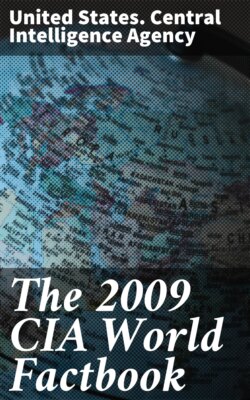Читать книгу The 2009 CIA World Factbook - United States. Central Intelligence Agency - Страница 367
На сайте Литреса книга снята с продажи.
NA
ОглавлениеGovernment ::Congo, Democratic Republic of the
Country name:
conventional long form: Democratic Republic of the Congo
conventional short form: DRC
local long form: Republique Democratique du Congo
local short form: RDC
former: Congo Free State, Belgian Congo, Congo/Leopoldville, Congo/Kinshasa, Zaire
abbreviation: DRC
Government type:
republic
Capital:
name: Kinshasa
geographic coordinates: 4 19 S, 15 18 E
time difference: UTC+1 (six hours ahead of Washington, DC during Standard Time)
Administrative divisions:
10 provinces (provinces, singular - province) and 1 city* (ville); Bandundu, Bas-Congo, Equateur, Kasai-Occidental, Kasai-Oriental, Katanga, Kinshasa*, Maniema, Nord-Kivu, Orientale, Sud-Kivu
note: according to the Constitution adopted in December 2005, the current administrative divisions will be subdivided into 26 new provinces by 2009
Independence:
30 June 1960 (from Belgium)
National holiday:
Independence Day, 30 June (1960)
Constitution:
18 February 2006
Legal system:
civil law based on Belgian law with Napleonic Civil Code influence; accepts compulsory ICJ jurisdiction with reservations
Suffrage:
18 years of age; universal and compulsory
Executive branch:
chief of state: President Joseph KABILA (since 17 January 2001); note - following the assassination of his father, Joseph KABILA succeeded to the presidency which he retained through the 2003–06 transition; he was subsequently elected president in October 2006
head of government: Prime Minister Adolphe MUZITO (since 10 October 2008)
cabinet: Ministers of State appointed by the president
elections: under the new constitution the president is elected by popular vote for a five-year term (eligible for a second term); elections last held 30 July 2006 and 29 October 2006 (next to be held in October 2011); prime minister appointed by the president
election results: Joseph KABILA elected president; percent of vote (second round) - Joseph KABILA 58%, Jean-Pierre BEMBA Gombo 42%
note: Joseph KABILA succeeded his father, Laurent Desire KABILA, following the latter's assassination in January 2001; negotiations with rebel leaders led to the establishment of a transitional government in July 2003 with free elections held on 30 July 2006 and a run-off on 29 October 2006 confirming Joseph KABILA as president
Legislative branch:
bicameral legislature consists of a Senate (108 seats; members elected by provincial assemblies to serve five-year terms) and a National Assembly (500 seats; 61 members elected by majority vote in single-member constituencies, 439 members elected by open list proportional-representation in multi-member constituencies; to serve five-year terms)
elections: Senate - last held 19 January 2007 (next to be held by 2012); National Assembly - last held 30 July 2006 (next to be held in July 2011)
election results: Senate - percent of vote by party - NA; seats by party - PPRD 22, MLC 14, FR 7, RCD 7, PDC 6, CDC 3, MSR 3, PALU 2, independents 26, others 18 (political parties that won a single seat); National Assembly - percent of vote by party - NA; seats by party - PPRD 111, MLC 64, PALU 34, MSR 27, FR 26, RCD 15, independents 63, others 160 (includes 63 political parties that won 10 or fewer seats)
Judicial branch:
Constitutional Court; Appeals Court or Cour de Cassation; Council of State; High Military Court; plus civil and military courts and tribunals
Political parties and leaders:
Christian Democrat Party or PDC [Jose ENDUNDO]; Congolese Rally for
Democracy or RCD [Azarias RUBERWA]; Convention of Christian
Democrats or CDC; Forces of Renewal or FR [Mbusa NYAMWISI]; Movement
for the Liberation of the Congo or MLC [Jean-Pierre BEMBA]; People's
Party for Reconstruction and Democracy or PPRD [Joseph KABILA];
Social Movement for Renewal or MSR [Pierre LUMBI]; Unified Lumumbist
Party or PALU [Antoine GIZENGA]; Union for Democracy and Social
Progress or UDPS [Etienne TSHISEKEDI]; Union of Mobutuist Democrats
or UDEMO [MOBUTU Nzanga]
Political pressure groups and leaders:
MONUC - UN organization working with the government; FARDC (Forces
Armees de la Republique Democratique du Congo) - Army of the
Democratic Republic of the Congo which commits atrocities on
citizens; FDLA (Forces Democratiques de Liberation du Rwanda) -
Rwandan militia group
International organization participation:
ACCT, ACP, AfDB, AU, CEPGL, COMESA, FAO, G-24, G-77, IAEA, IBRD,
ICAO, ICCt, ICRM, IDA, IFAD, IFC, IFRCS, IHO (suspended), ILO, IMF,
IMO, Interpol, IOC, IOM, IPU, ISO, ITSO, ITU, ITUC, MIGA, NAM, OIF,
OPCW, PCA, SADC, UN, UNCTAD, UNESCO, UNHCR, UNIDO, UNWTO, UPU, WCL,
WCO, WFTU, WHO, WIPO, WMO, WTO
Diplomatic representation in the US:
chief of mission: Ambassador Faida MITIFU
chancery: Suite 601, 1726 M Street, NW, Washington, DC, 20036
telephone: [1] (202) 234–7690 through 7691
